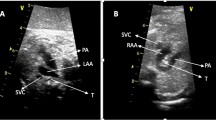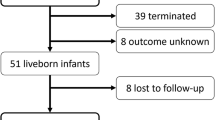Abstract
To estimate if there is an association between partial AVSD with chromosomal abnormalities, cardiac and extracardiac malformations, and to report the outcomes of prenatally diagnosed AVSD in a large, contemporary cohort. This is a retrospective cohort study of 190 prenatally diagnosed fetal AVSD between 2014 and 2023. Type of AVSD (complete vs partial), additional cardiac findings, extracardiac findings, presence of a heterotaxy, results of prenatal karyotype, and pregnancy outcomes were documented and analyzed. A total of 190 cases of fetal AVSD were analyzed. Complete AVSDs comprised 141 (74.2%) of the cohort, while partial AVSDs comprised 49 (25.7%). Karyotype was completed in 131 cases, and in 98 (74.8%) cases chromosomal abnormalities were identified, with trisomy 21 being the most common (53/131, 40.5%). Complete AVSDs were associated with trisomy 21 (45.5%, p = 0.04), Isolated cases of complete AVSDs (p = 0.03). Partial AVSDs were associated with trisomy 18 (53.1%, p < 0.001). In cases of partial AVSDs with aneuploidies, 7 (70%) had an ostium primum defect and 20 (90.9%) of AV canal type VSD. Isolated partial AVSD had no clear association with aneuploidies. There were additional cardiac anomalies in 96 (50.5%) and extracardiac anomalies in 134 (70.5%) of the cohort. There were no differences between partial and complete AVSD in rate of additional cardiac and extracardiac anomalies. AVSD was part of a heterotaxy in 47 (24.7%) of cases, and heterotaxy was associated with complete AVSD in the majority of cases (43/47, 91.4%, p = 0.003). Fetal partial AVSDs are associated with trisomy 18. Fetal complete AVSDs, even isolated, are associated with trisomy 21. There were no differences in association of other aneuploidies, additional cardiac findings, or extracardiac anomalies between prenatally diagnosed complete AVSDs and partial AVSDs.




Similar content being viewed by others
Data Availability
The data that support the findings of this study are available from the corresponding author upon reasonable request.
References
Reller MD, Strickland MJ, Riehle-Colarusso T, Mahle WT, Correa A (2008) Prevalence of congenital heart defects in metropolitan Atlanta, 1998–2005. J Pediatr 153(6):807–813
Yagel S, Silverman NH, Gembruch U (eds) (2019) Fetal cardiology: embryology, genetics, physiology, echocardiographic evaluation, diagnosis, and perinatal management of cardiac diseases. CRC Press, Boca Raton
Delisle MF, Sandor GG, Tessier F, Farquharson DF (1999) Outcome of fetuses diagnosed with atrioventricular septal defect. Obstet Gynecol 94(5 Pt 1):763–767
Huggon IC, Cook AC, Smeeton NC, Magee AG, Sharland GK (2000) Atrioventricular septal defects diagnosed in fetal life: associated cardiac and extra-cardiac abnormalities and outcome. J Am Coll Cardiol 36(2):593–601
Langford K, Sharland G, Simpson J (2005) Relative risk of abnormal karyotype in fetuses found to have an atrioventricular septal defect (AVSD) on fetal echocardiography. Prenat Diagn 25(2):137–139
Paladini D, Volpe P, Sglavo G et al (2009) Partial atrioventricular septal defect in the fetus: diagnostic features and associations in a multicenter series of 30 cases. Ultrasound Obstet Gynecol 34(3):268–273
von Elm E, Altman DG, Egger M et al (2007) The strengthening the reporting of observational studies in epidemiology (STROBE) statement: guidelines for reporting observational studies. Lancet 370(9596):1453–1457
Salomon LJ, Alfirevic Z, Berghella V et al (2011) Practice guidelines for performance of the routine mid-trimester fetal ultrasound scan. Ultrasound Obstet Gynecol 37(1):116–126
Carvalho JS, Allan L, Chaoui R et al (2013) ISUOG Practice guidelines (updated): sonographic screening examination of the fetal heart. Ultrasound Obstet Gynecol 41(3):348–359
Calkoen EE, Hazekamp MG, Blom NA et al (2016) Atrioventricular septal defect: from embryonic development to long-term follow-up. Int J Cardiol 202:784–795
Abuhamad A, Chaoui R (2021) A practical guide to fetal echocardiography: normal and abnormal hearts. Wolters Kluwer Health, Alphen aan den Rijn
Vanaparthy R, Mahdy H (2023) Hydrops fetalis.StatPearls Publishing LLC, Treasure Island
Welke KF, Morris CD, King E et al (2007) Population-based perspective of long-term outcomes after surgical repair of partial atrioventricular septal defect. Ann Thorac Surg 84(2):624–628
Loffredo CA, Hirata J, Wilson PD, Ferencz C, Lurie IW (2001) Atrioventricular septal defects: possible etiologic differences between complete and partial defects. Teratology 63(2):87–93
Van Praagh S, Truman T, Firpo A et al (1989) Cardiac malformations in trisomy-18: a study of 41 postmortem cases. J Am Coll Cardiol 13(7):1586–1597
Morlando M, Bhide A, Familiari A et al (2017) The association between prenatal atrioventricular septal defects and chromosomal abnormalities. Eur J Obstet Gynecol Reprod Biol 208:31–35
Berg C, Kaiser C, Bender F et al (2009) Atrioventricular septal defect in the fetus-associated conditions and outcome in 246 cases. Ultraschall Med 30(1):25–32
Friedberg MK, Kim N, Silverman NH (2007) Atrioventricular septal defect recently diagnosed by fetal echocardiography: echocardiographic features, associated anomalies, and outcomes. Congenit Heart Dis 2(2):110–114
Słodki M, Soroka M, Rizzo G, Respondek-Liberska M (2020) Prenatal Atrioventricular Septal Defect (AVSD) as a planned congenital heart disease with different outcome depending on the presence of the coexisting extracardiac abnormalities (ECA) and/or malformations (ECM). J Matern Fetal Neonatal Med 33(15):2635–2641
Qiao F, Wang Y, Zhang C et al (2021) Comprehensive evaluation of genetic variants using chromosomal microarray analysis and exome sequencing in fetuses with congenital heart defect. Ultrasound Obstet Gynecol 58(3):377–387
Quinton AE, Kennedy N, Gooi A (2023) Atrioventricular septal defect: an extended approach to prenatal sonographic imaging of the atrioventricular valves. Sonography 10(4):184–191
Rasiah SV, Ewer AK, Miller P et al (2008) Outcome following prenatal diagnosis of complete atrioventricular septal defect. Prenat Diagn 28(2):95–101
Acknowledgements
The authors would like to thank Ms. Elif Delen Deveci for being an invaluable part of the perinatology team; arranging patient relations and helping authors in data collection.
Funding
None declared.
Author information
Authors and Affiliations
Contributions
All authors have accepted responsibility for the entire content of this manuscript and approved its submission.
Corresponding author
Ethics declarations
Competing interests
The authors state no conflict of interest.
Additional information
Publisher's Note
Springer Nature remains neutral with regard to jurisdictional claims in published maps and institutional affiliations.
Rights and permissions
Springer Nature or its licensor (e.g. a society or other partner) holds exclusive rights to this article under a publishing agreement with the author(s) or other rightsholder(s); author self-archiving of the accepted manuscript version of this article is solely governed by the terms of such publishing agreement and applicable law.
About this article
Cite this article
Ayhan, I., Demirci, O., Odacılar, A.Ş. et al. Revisiting Atrioventricular Septal Defects: Exploring Chromosomal Abnormalities, Cardiac and Extracardiac Anomalies in a Contemporary Prenatal Cohort. Pediatr Cardiol 45, 1036–1047 (2024). https://doi.org/10.1007/s00246-024-03477-x
Received:
Accepted:
Published:
Issue Date:
DOI: https://doi.org/10.1007/s00246-024-03477-x




